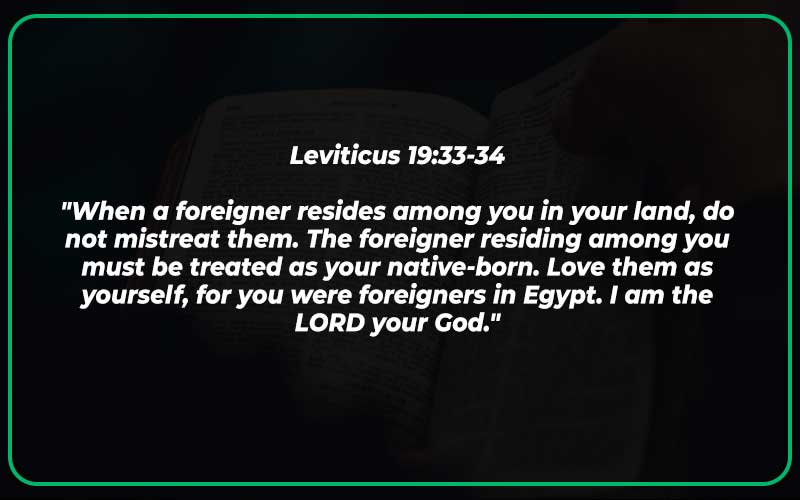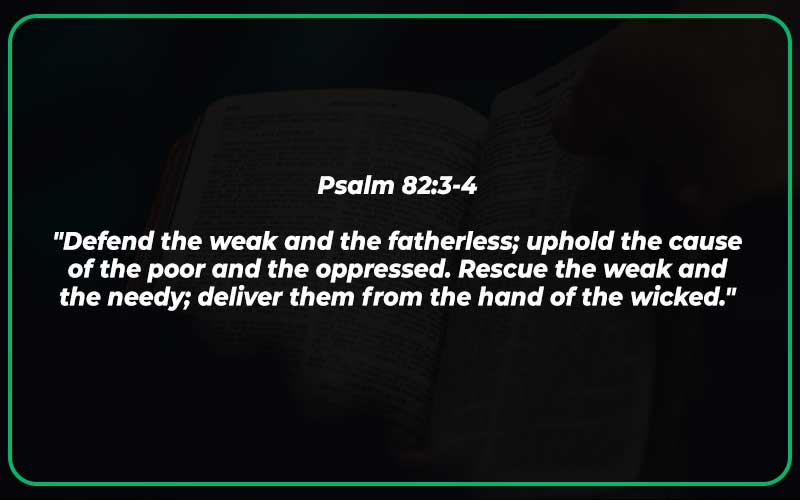It’s important to understand how we should treat foreigners. After all, no one wants to be treated differently or unfairly simply because of their nationality. The Bible provides us with valuable insight on how to treat foreigners.
Here are some powerful verses to reflect on when it comes to how to welcome and treat foreigners in our society. Whether you are a believer or not, these verses can provide us with a helpful reminder about the importance of acceptance and kindness.
Also Read: Top 25 Bible Verses About Suffering and Death (With Commentary)
Bible Verses About How to Treat Foreigners
1. Leviticus 19:33-34
“When a foreigner resides among you in your land, do not mistreat them. The foreigner residing among you must be treated as your native-born. Love them as yourself, for you were foreigners in Egypt. I am the LORD your God.”
This verse emphasizes the importance of treating foreigners with kindness and equality. It reminds the Israelites to remember their own experience as foreigners in Egypt and to show compassion and love to those who are living in their land.

2. Deuteronomy 10:19
“And you are to love those who are foreigners, for you yourselves were foreigners in Egypt.”
This verse reiterates the command to love foreigners because the Israelites themselves were once foreigners in Egypt. It teaches us that our past experiences can help us empathize with and show kindness to those who are different from us.
3. Exodus 22:21
“Do not mistreat or oppress a foreigner, for you were foreigners in Egypt.”
God reminds His people not to oppress or mistreat foreigners, again highlighting the Israelites’ own history as foreigners. This verse reminds us that we should not take advantage of or discriminate against those who are strangers in our land.
4. Jeremiah 22:3
“This is what the LORD says: Do what is just and right. Rescue from the hand of the oppressor the one who has been robbed. Do no wrong or violence to the foreigner, the fatherless or the widow, and do not shed innocent blood in this place.”
God calls His people to stand for justice, not only for their fellow citizens but also for foreigners, orphans, and widows. This verse reminds us of the importance of protecting and advocating for the rights of all, regardless of their nationality or background.
5. Exodus 23:9
“Do not oppress a foreigner; you yourselves know how it feels to be foreigners because you were foreigners in Egypt.”
Once again, God reminds His people to treat foreigners with kindness and respect, based on their own experience as foreigners. This verse encourages empathy and understanding towards those who are different from us.
6. Romans 12:13
“Share with the Lord’s people who are in need. Practice hospitality.”
As Christians, we are called to be hospitable and generous, not only to our own community but also to those in need, including foreigners. This verse encourages us to open our hearts and homes to welcome and support others, regardless of their background.
7. Matthew 25:35
“For I was hungry and you gave me something to eat, I was thirsty and you gave me something to drink, I was a stranger and you invited me in.”
In this verse, Jesus teaches us the importance of extending kindness and hospitality to strangers. By doing so, we are serving Him and showing His love to others. It reminds us to treat foreigners with care and compassion.
8. 1 Peter 4:9
“Offer hospitality to one another without grumbling.”
Hospitality should be given willingly and graciously, without complaining. This verse reminds us to have a welcoming attitude towards others, including foreigners, demonstrating Christ’s love through our actions.
9. Hebrews 13:2
“Do not forget to show hospitality to strangers, for by so doing some people have shown hospitality to angels without knowing it.”
This verse encourages believers to practice hospitality, for we never know who we may be extending kindness towards. It reminds us that by showing love and generosity to strangers, we may be unknowingly blessed by heavenly beings.
10. Psalm 146:9
“The LORD watches over the foreigner and sustains the fatherless and the widow, but he frustrates the ways of the wicked.”
God takes special care of foreigners, as well as orphans and widows. This verse reassures us that God’s provision and protection extend to all who are vulnerable and in need, regardless of their nationality.

11. Ezekiel 47:22-23
“You are to allot it as an inheritance for yourselves and for the foreigners residing among you and who have children. You are to consider them as native-born Israelites; along with you, they are to be allotted an inheritance among the tribes of Israel. In whatever tribe a foreigner resides, there you are to give them their inheritance,” declares the Sovereign LORD.”
This verse demonstrates God’s desire for foreigners to be included and treated as equal members of the community. He commands the Israelites to consider foreigners as native-born, giving them the same rights and privileges, including inheritance. It serves as a reminder to treat foreigners with equity and inclusion.
12. Matthew 5:43-44
“You have heard that it was said, ‘Love your neighbor and hate your enemy.’ But I tell you, love your enemies and pray for those who persecute you.”
Although not specifically about foreigners, this verse encourages us to extend love and prayers even to our enemies. It reminds us that our love should extend beyond cultural, national, or ethnic boundaries and should encompass all people, including foreigners.
13. Galatians 3:28
“There is neither Jew nor Gentile, neither slave nor free, nor is there male and female, for you are all one in Christ Jesus.”
In Christ, there are no divisions based on race, social status, or gender. This verse highlights the equality of all believers, regardless of their background. It serves as a reminder to treat foreigners with the same love and respect as we would fellow believers.
14. Mark 12:31
“The second is this: ‘Love your neighbor as yourself.’ There is no commandment greater than these.”
This verse captures the essence of treating others, including foreigners, with love and compassion. It reminds us of the greatest commandment to love our neighbors as ourselves, urging us to extend our care and kindness to all people, regardless of their nationality or status.
15. 1 John 4:7-8
“Dear friends, let us love one another, for love comes from God. Everyone who loves has been born of God and knows God. Whoever does not love does not know God, because God is love.”
God’s love is the source of our ability to love others. This verse emphasizes the importance of love in our relationships and interactions with both believers and foreigners. It reminds us that true love reflects God’s character and should be evident in our treatment of all people.
16. James 2:8
“If you really keep the royal law found in Scripture, ‘Love your neighbor as yourself,’ you are doing right.”
By following the command to love our neighbors as ourselves, we are fulfilling the royal law found in Scripture. This verse emphasizes that treating foreigners with love and respect aligns with God’s desire for His people to do what is right.
17. Ephesians 2:19
“Consequently, you are no longer foreigners and strangers, but fellow citizens with God’s people and also members of his household.”
Through faith in Christ, believers are no longer considered foreigners or strangers but are now part of God’s family. This verse reminds us that our identity as children of God supersedes any cultural or national distinctions. It encourages us to treat foreigners as fellow citizens of God’s Kingdom.
18. Luke 10:27
“He answered, ‘Love the Lord your God with all your heart and with all your soul and with all your strength and with all your mind’; and, ‘Love your neighbor as yourself.'”
This verse encapsulates the two greatest commandments of loving God and loving our neighbors. By loving our neighbors, including foreigners, we are demonstrating our love for God. It serves as a reminder to prioritize and cultivate love in our relationships with others.
19. Romans 13:9
“The commandments, ‘You shall not commit adultery,’ ‘You shall not murder,’ ‘You shall not steal,’ ‘You shall not covet,’ and whatever other command there may be, are summed up in this one command: ‘Love your neighbor as yourself.'”
This verse reinforces the command to love our neighbors as ourselves as the fulfillment of all God’s commandments. By treating foreigners with love and respect, we are living out the principles of God’s law and reflecting His character to those around us.
20. Colossians 3:11
“Here there is no Gentile or Jew, circumcised or uncircumcised, barbarian, Scythian, slave or free, but Christ is all, and is in all.”
In Christ, there are no distinctions based on nationality, ethnicity, or status. This verse reminds us that our unity is found in Christ, not in our differences. Therefore, we should treat foreigners with the same love and acceptance as Christ has shown to us.
21. Proverbs 14:21
“Whoever despises his neighbor is a sinner, but blessed is he who is generous to the poor.”
This verse emphasizes the importance of generosity towards our neighbors, including foreigners. It reminds us that showing kindness and meeting the needs of others, particularly those who are less fortunate, brings blessings and reflects a heart that is pleasing to God.
22. Proverbs 29:7
“The righteous care about justice for the poor, but the wicked have no such concern.”
This verse highlights the righteousness of those who prioritize justice and care for the poor, including foreigners. It serves as a reminder that our treatment of others reflects our character and relationship with God. As believers, we should have a genuine concern for justice and the well-being of all people.
23. Psalm 82:3-4
“Defend the weak and the fatherless; uphold the cause of the poor and the oppressed. Rescue the weak and the needy; deliver them from the hand of the wicked.”
God calls His people to defend, uphold, and rescue those who are weak, oppressed, and in need. This verse applies to foreigners as well, reminding us of our responsibility to protect and advocate for their rights and well-being.

24. Micah 6:8
“He has shown you, O mortal, what is good. And what does the LORD require of you? To act justly and to love mercy and to walk humbly with your God.”
This verse highlights the qualities that God desires in His people: acting justly, loving mercy, and walking humbly with Him. It reminds us that our treatment of foreigners should reflect justice, kindness, and humility, aligning with God’s desires for His followers.
25. Matthew 25:40
“The King will reply, ‘Truly I tell you, whatever you did for one of the least of these brothers and sisters of mine, you did for me.”
This verse serves as a poignant reminder that when we show kindness, love, and care to the least and marginalized, including foreigners, we are directly impacting Christ Himself. It underscores the significance of our actions towards others and encourages us to treat foreigners with the same love and respect we would extend to Christ.
What does the Bible say About How to Treat Foreigners?
In the Bible, the treatment of foreigners, often referred to as “strangers,” “sojourners,” or “aliens,” is a recurring theme that emphasizes principles of compassion, fairness, and hospitality. The Old Testament, particularly in the books of Exodus, Leviticus, and Deuteronomy, provides explicit instructions about how the Israelites should treat foreigners.
1. Compassion and Fairness: The Bible consistently emphasizes treating foreigners with compassion and fairness, reminding the Israelites that they were once foreigners themselves in Egypt. For instance, in Exodus 22:21, it’s commanded, “You shall not wrong a sojourner or oppress him, for you were sojourners in the land of Egypt.”
2. Equality before the Law: The principle of equal treatment under the law is reinforced throughout the Bible. In Leviticus 24:22, it is stated, “You shall have the same rule for the sojourner and for the native, for I am the Lord your God.”
3. Hospitality and Generosity: The Bible encourages the Israelites to extend hospitality and generosity to foreigners. In Leviticus 19:33-34, it is written, “When a stranger sojourns with you in your land, you shall not do him wrong. You shall treat the stranger who sojourns with you as the native among you, and you shall love him as yourself.”
4. Inclusion in Religious Practices: Foreigners were not to be excluded from participating in religious practices. In Isaiah 56:6-7, it’s stated, “And the foreigners who join themselves to the Lord, to minister to him… these I will bring to my holy mountain, and make them joyful in my house of prayer.”
5. Kindness and Provision: In Deuteronomy 10:18-19, it’s written, “He executes justice for the fatherless and the widow, and loves the sojourner, giving him food and clothing. Love the sojourner, therefore, for you were sojourners in the land of Egypt.”
6. Welcoming the Stranger: The Bible often reminds believers of the importance of welcoming strangers. Hebrews 13:2 says, “Do not neglect to show hospitality to strangers, for thereby some have entertained angels unawares.”
Overall, the Bible emphasizes a compassionate and just approach to foreigners, rooted in the understanding of the shared humanity and the experience of being outsiders. These principles encourage believers to treat foreigners with respect, kindness, and equality, reflecting the values of love and empathy.

